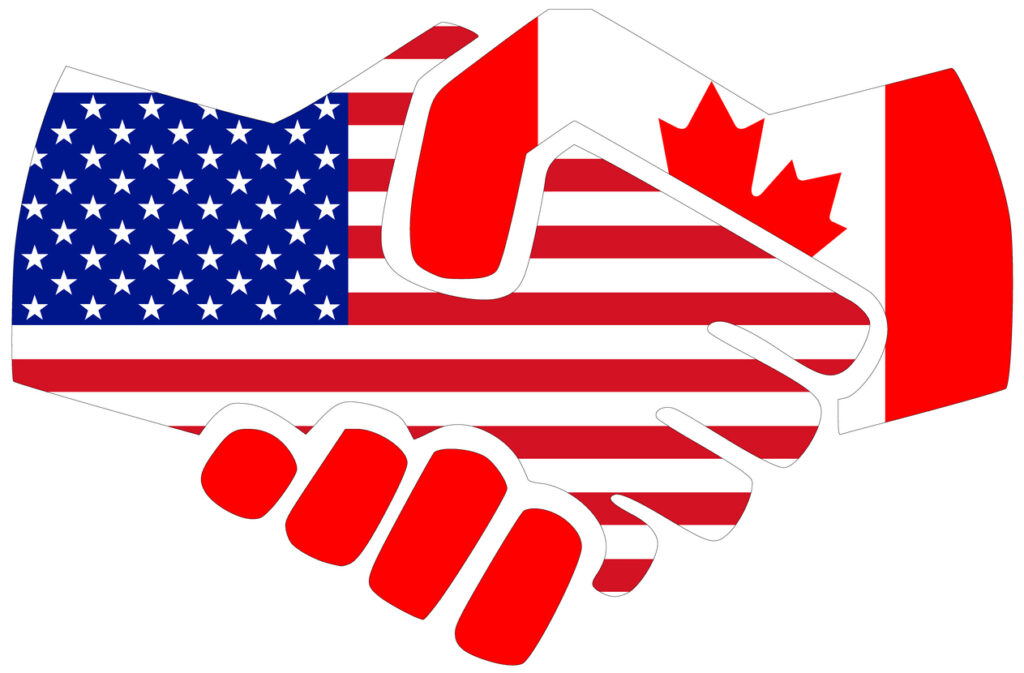Friends Beyond Borders: Cross-Border Counsel in Challenging Times

Click here to download a PDF of this article.
Introduction: Neighbors Facing Headwinds, Together
This year has seen U.S.–Canada trade relations tested by a flurry of policy headwinds. Early this spring, the United States abruptly imposed sweeping tariffs – 25% on most Canadian imports (with a 10% rate on energy products) – sparking a quick retaliation from Ottawa. Disagreements have flared over issues like Canada’s new digital services tax and other regulatory divides. To the casual observer, it may seem the “friendliest border” in the world is under strain. Yet beyond the political headlines, the cross-border legal and business communities continue to work hand-in-hand, reinforcing a simple truth: when it comes to U.S. and Canadian partners, we’re still friends, we still love you.
Economic integration between the two countries runs deep. Over 700 Canadian companies operate in just the state of Ohio and regions like the Great Lakes have built cars together across the U.S.-Canada border for 120 years now. With such intertwined supply chains and markets, businesses depend on cross-border coordination. Fortunately, a robust framework of legal cooperation underpins this integration. From trade pact dispute mechanisms to industry coalitions and law firm networks, the U.S. and Canada have developed extensive channels for resolving frictions. In the following sections, we explore recent examples in the automotive, technology, and energy sectors that showcase how relationship-first collaboration is overcoming today’s geopolitical tensions.
Automotive: Driving Integration Forward
If any industry illustrates North American togetherness, it’s automotive. Cars and parts routinely crisscross the border multiple times before final assembly. This highly integrated ecosystem was put in the crosshairs when new U.S. tariffs on imported vehicles and parts were announced in March 2025. Facing these challenges, legal professionals and industry groups in the auto sector moved quickly to problem-solve jointly. A powerful example came from automotive recyclers: the U.S.-based Automotive Recyclers Association (ARA) teamed up with the Automotive Recyclers of Canada to petition Washington for relief. In a joint letter to President Trump at the end of April, they urged that recycled auto parts be exempted from the new tariffs, given how interdependent the used parts market is across the border. Without an exemption, both countries’ recycling industries and consumers would suffer. This collaborative advocacy paid dividends: it brought cross-border attention to an unintended consequence of the policy and opened a dialogue with regulators for a fix.
Behind the scenes, cross-border legal teams have also been hard at work helping automakers and suppliers adjust. Thanks to the USMCA trade agreement, many Canadian-built cars and parts still enter the U.S. tariff-free if they meet North American content rules. Lawyers on both sides have been guiding companies through these rules to maximize duty-free shipments and reconfigure supply lines as needed. Canadian trade counsel coordinate closely with U.S. counterparts – for example, advising clients on Canadian surtaxes while U.S. attorneys handle American tariff compliance.
Technology: Bridging Policy Gaps in the Digital Economy
The tech sector has seen its share of cross-border tensions too, particularly around taxation and regulation of big digital companies. Canada’s recently enacted Digital Services Tax (DST) – a 3% levy on revenue from online platforms and ads – has been a thorn in U.S.–Canada relations over the past year. U.S. officials view the DST as unfairly targeting American tech giants, and in late 2024 the United States Trade Representative formally challenged the Canadian tax under USMCA’s dispute resolution mechanism. In tandem, U.S. lawmakers have rattled sabers with retaliatory measures – the U.S. House even passed a bill authorizing special taxes on countries with DSTs, clearly aiming to pressure Ottawa.
Yet, here too, collaboration and cooler heads in the legal arena are paving a path forward. For one, both countries are engaging through formal USMCA consultations rather than escalating to a trade war. Importantly, this process involves extensive work by legal advisors and diplomats on both sides to find common ground. Canadian officials have already delayed collecting DST payments pending the global OECD tax deal, and ongoing talks could yet defuse the issue. In the meantime, cross-border tech business carries on largely unaffected – a testament to careful legal planning.
Major tech companies operating in both countries are leaning on their advisors to navigate the uncertainty. Contingency plans are in place: companies are modeling the impact of the DST and any U.S. counter-tariffs on their operations. Many are engaging trade counsel and industry associations to advocate for their interests and ensure compliance with any new rules. Throughout, the free flow of data and services across the border – crucial to tech firms – has continued uninterrupted, thanks to harmonized cybersecurity and privacy efforts by regulators. In fact, on issues like data privacy and AI ethics, U.S. and Canadian legal experts have been sharing best practices in forums and working groups, ensuring that policy divergence doesn’t lead to practical incompatibility for companies. At the end of the day, innovation knows no borders, and the legal professionals in tech are making sure regulatory friction is kept in check through cooperation, not confrontation.
Energy: Powering a Partnership
Energy has long been a cornerstone of the U.S.–Canada alliance and cooperation, and it remains so even amid political headwinds. Decades of policy coordination and trade liberalization have made North America an energy powerhouse. Successive agreements cemented free trade in oil, gas, and electricity, allowing production to flourish and keeping prices steady. Today, North America is the world’s largest producer of oil and natural gas, and a top exporter of both LNG and crude.
The blanket U.S. tariffs imposed in March initially hit Canadian energy exports with a 10% levy, and Canada’s retaliation notably spared energy but signaled that any disruption cuts both ways. Canadian oil has few places to go but south, and many U.S. regions rely on Canadian electricity and fuel. Recognizing this mutual dependency, officials on each side have been careful to keep energy flowing despite political posturing. When Ontario’s premier briefly threatened a surcharge on electricity exports to the U.S. as a countermeasure, he quickly stood down after dialogue with U.S. counterparts. Cooler heads agreed to talk it out rather than flip any switches – a pragmatic outcome that lawyers and diplomats quietly helped facilitate.
On a more optimistic front, the clean energy transition is creating new avenues for U.S.-Canadian legal collaboration. Both countries are investing in cross-border infrastructure for renewable power and in joint strategies for critical minerals (essential for EV batteries and clean tech). A recent high-level panel noted that Canada and the U.S. are reshaping partnerships to secure critical mineral supply chains together. This has led to co-investments – for example, the U.S. Department of Defense is working with Canadian firms to develop mines for rare earth elements. Such projects inevitably involve navigating both Canadian regulatory approvals and U.S. funding rules, requiring teams of lawyers from both jurisdictions to coordinate to draft agreements, align compliance with environmental standards, and obtain permits from multiple authorities. In sum, the energy sector shows that even when policy winds shift, the underlying partnership adapts and charges forward.
Networks and Trust: The Legal Community as a Bridge
One secret ingredient sustaining U.S.–Canada collaboration is the strength of professional networks and relationships. Lawyers often joke that the “real diplomacy” happens in law firm conference rooms and over Zoom calls with cross-border colleagues. Networks like USLAW – a consortium of independent law firms across North America – play a pivotal role in binding the two legal communities closer. It provides a collegial, collaborative forum where American and Canadian attorneys can leverage each other’s local expertise and connections to better serve clients in cross-border matters.
In the last few months, USLAW has even expanded its Canadian ranks – a sign of the growing integration of our legal markets. In May 2025, the network welcomed a new member firm in Alberta, giving USLAW a presence in Western Canada. “Parlee McLaws provides our members and their clients with an experienced team of attorneys in Western Canada and delivers another important resource for clients who have business assets, operations and employees across Canada,” said USLAW’s chair in announcing the addition. Canadian partners likewise expressed enthusiasm to bring their local knowledge and “relationship-focused approach” to the broader network.
Referrals through USLAW and similar networks ensure clients get seamless cross-border service without the friction one might expect in an international matter.
Conclusion: Relationship-First in Every Climate
In short, the legal community has formed its own bridge across the 49th parallel, one that remains sturdy regardless of which politicians are sparring at any given moment. Lawyers and corporate counsel in both countries know that economies are too intertwined – and their people too historically friendly – to let transient policy fights upend the fundamental alliance. Whether it’s auto executives and attorneys crafting joint appeals for tariff relief, tech companies coordinating compliance through legal channels, or energy regulators quietly working out solutions to keep the lights on, the prevailing mindset is solve it together. As North America navigates the current headwinds, the optimistic narrative is very much alive: we’re still neighbors, still trading, and yes, we’re still friends.



Kelly Santini LLP, Therrien Couture Joli-Coeur LLP and Parlee McLaws LLP are Canadian members of USLAW Network Inc.



